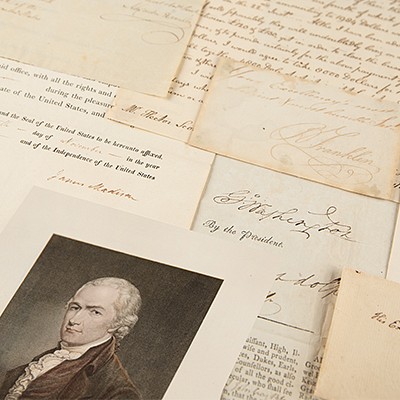Theodore Roosevelt Document Signed as President, Appropriating Funds for Representatives of the Cherokee Nation
Two ways to bid:
- Leave a max absentee bid and the platform will bid on your behalf up to your maximum bid during the live auction.
- Bid live during the auction and your bids will be submitted real-time to the auctioneer.
Bid Increments
| Price | Bid Increment |
|---|---|
| $0 | $5 |
| $50 | $10 |
| $200 | $25 |
| $500 | $50 |
About Auction
Oct 11, 2023
RR Auction support@rrauction.com
- Lot Description
DS as president, signed “T. Roosevelt,” three pages, 8.5 x 13.75, January 23, 1903. Official document issued by the Executive Office of the Cherokee Nation, which finds T. M. Buffington, as Principal Chief of the Cherokee Nation, certifying and submitting for the approval of President Roosevelt the Act of Congress (31 Stat. 1058) entitled, ‘An Act Making Appropriations for the Current and Contingent Expenses of the Indian Department and for Fulfilling Treaty Stipulations with Various Indian Tribes for the Fiscal Year Ending June 30, 1902, and for Other Purposes.’ Signed at the conclusion in fountain pen by Theodore Roosevelt and countersigned by Buffington. The first two pages, regarding Senate Bill No. 27, “An act making an appropriation to pay the per diem and expenses of the Representatives of the Cherokee Nation at the Conference of the Five Civilized Tribes held at Eufaula, Indian Territory, on the 28th day of November 1902,” lists the recipients and the related expenditures, amounting to a total of $134.95, which is signed by Buffington and three others at the conclusion. The file folder and the lower right of two pages bear ownership stamps belonging to “The Thos. J. Harrison Private Library.” In fine condition.
The Conference of the Five Civilized Tribes was a significant series of meetings and negotiations between the federal government and the Five Civilized Tribes, which included the Cherokee, Chickasaw, Choctaw, Creek (Muscogee), and Seminole nations. The primary purpose of these meetings was to address land allotments and the dissolution of tribal governments and communal land ownership. The events of this conference were part of the broader transition of Indian Territory (which included the Five Civilized Tribes) into the state of Oklahoma, which officially occurred in 1907. While the specific conference at Eufaula in 1902 was conducted primarily by government officials and tribal leaders, it was part of a broader federal policy that Roosevelt supported and continued from his predecessors.
During his presidency, Roosevelt advocated for the continuation of policies aimed at assimilating Native American tribes into mainstream American society. This included the implementation of the Dawes Act and related legislation, which promoted the division of tribal lands into individual allotments and the dissolution of tribal governments. Roosevelt believed in the concept of ‘civilizing’ Native Americans by encouraging them to adopt farming and other aspects of Western culture. His administration continued to oversee the implementation of these policies, which had a significant impact on the Five Civilized Tribes and other Native American nations. - Shipping Info
-
Bidder is liable for shipping and handling and providing accurate information as to shipping or delivery locations and arranging for such. RR Auction is unable to combine purchases from other auctions or affiliates into one package for shipping purposes. Lots won will be shipped in a commercially reasonable time after payment in good funds for the merchandise and the shipping fees are received or credit extended, except when third-party shipment occurs. Bidder agrees that service and handling charges related to shipping items which are not pre-paid may be charged to a credit card on file with RR Auction. Successful international Bidders shall provide written shipping instructions, including specified Customs declarations, to RR Auction for any lots to be delivered outside of the United States. NOTE: Declaration value shall be the item’(s) hammer price and RR Auction shall use the correct harmonized code for the lot. Domestic Bidders on lots designated for third-party shipment must designate the common carrier, accept risk of loss, and prepay shipping costs.
-
- Buyer's Premium



 EUR
EUR CAD
CAD AUD
AUD GBP
GBP MXN
MXN HKD
HKD CNY
CNY MYR
MYR SEK
SEK SGD
SGD CHF
CHF THB
THB













